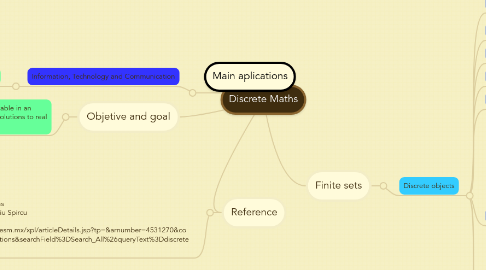
1. Main aplications
1.1. Information, Technology and Communication
1.1.1. Sub / aplications
1.1.1.1. Knowledge Managemet
1.1.1.1.1. Intelligent Information Systems
1.1.1.2. Database Systems
1.1.1.2.1. Relational, entityrelationship
1.1.1.3. Software Engineering
1.1.1.3.1. Program Verification
1.1.1.4. Programming Languages/Data Structures
1.1.1.4.1. Object-Oriented Approaches
1.1.1.5. Hardware Topics
1.1.1.5.1. Circuit Design/Optimization
2. Objetive and goal
2.1. To make students confortable in an enviroment, seeking for solutions to real problems
3. Reference
3.1. The central role of discrete mathematics in the context of information technology and communications Autores: Eugene Roventa, Tiberiu Spircu Ubicado en: http://0- ieeexplore.ieee.org.millenium.itesm.mx/xpl/articleDetails.jsp?tp=&arnumber=4531270&co ntentType=Conference+Publications&searchField%3DSearch_All%26queryText%3Ddiscrete +mathematics
4. Finite sets
4.1. Discrete objects
4.1.1. Classical and fuzzy logic
4.1.1.1. A logical system that generalizes the classical two-valued logic
4.1.2. Sets and combinatorics
4.1.3. Functions
4.1.4. Relations and matrices
4.1.5. Induction and recursion
4.1.6. Algorithms, graphs and trees
4.1.6.1. Aplications
4.1.6.1.1. Neural nets
4.1.6.1.2. Semantic nets
4.1.6.1.3. Bayesian (Causal) Networks
4.1.6.1.4. Minimum Spanning Trees
4.1.6.1.5. Binary Trees
4.1.6.1.6. Compression of stored or transmitted data using Huffman algorithm
4.1.6.1.7. Creating a totally ordered list and searching items
4.1.6.1.8. The reverse Polish notation
4.1.7. Boolean algebra
4.1.7.1. Boolean algebra is the theoretical basis for computer logic design
4.1.8. Formal logic
4.1.8.1. Science that studies by means of mathematical tools
